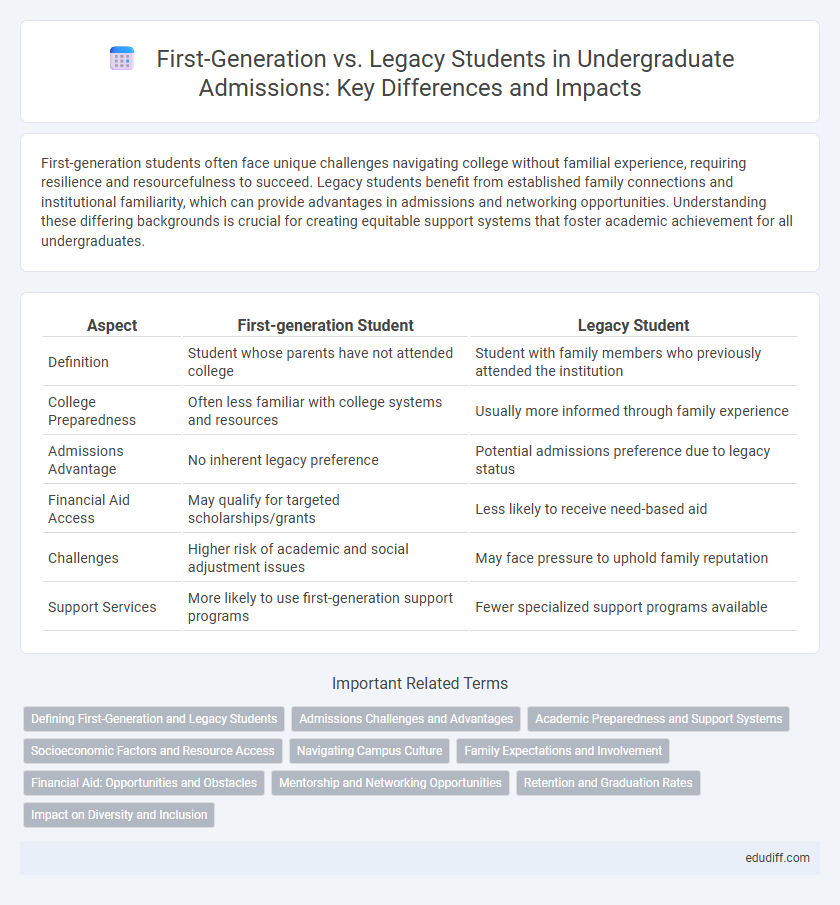First-generation students often face unique challenges navigating college without familial experience, requiring resilience and resourcefulness to succeed. Legacy students benefit from established family connections and institutional familiarity, which can provide advantages in admissions and networking opportunities. Understanding these differing backgrounds is crucial for creating equitable support systems that foster academic achievement for all undergraduates.
Table of Comparison
| Aspect | First-generation Student | Legacy Student |
|---|---|---|
| Definition | Student whose parents have not attended college | Student with family members who previously attended the institution |
| College Preparedness | Often less familiar with college systems and resources | Usually more informed through family experience |
| Admissions Advantage | No inherent legacy preference | Potential admissions preference due to legacy status |
| Financial Aid Access | May qualify for targeted scholarships/grants | Less likely to receive need-based aid |
| Challenges | Higher risk of academic and social adjustment issues | May face pressure to uphold family reputation |
| Support Services | More likely to use first-generation support programs | Fewer specialized support programs available |
Defining First-Generation and Legacy Students
First-generation students are those whose parents have not completed a four-year college degree, often facing unique challenges such as navigating the admissions process without familial college experience. Legacy students are applicants with at least one parent or close relative who attended the institution, potentially benefiting from established connections during admissions. Understanding these definitions aids universities in tailoring support services and admissions policies to meet diverse student needs.
Admissions Challenges and Advantages
First-generation students face unique admissions challenges including limited access to college preparation resources and lower familiarity with application procedures, often requiring targeted support and outreach programs. Legacy students benefit from established family ties within institutions, which can enhance admissions prospects through alumni influence and demonstrated institutional loyalty. Understanding these dynamics helps universities create equitable admissions policies and support systems to level the playing field.
Academic Preparedness and Support Systems
First-generation students often face unique challenges in academic preparedness due to limited access to advanced coursework and college guidance compared to legacy students, who typically benefit from familial experience with higher education. Support systems such as tutoring, mentorship programs, and academic advising are crucial for bridging gaps in knowledge and resources among first-generation undergraduates. Legacy students may have stronger informal networks, but structured support is essential for leveling the playing field in academic performance and college retention rates.
Socioeconomic Factors and Resource Access
First-generation students often face significant socioeconomic challenges, including limited financial resources and lack of familial guidance on navigating higher education. Legacy students typically benefit from established family connections and accumulated wealth, granting easier access to scholarships, networking opportunities, and campus resources. These disparities affect academic performance and campus engagement, highlighting the need for targeted support programs to bridge resource gaps.
Navigating Campus Culture
First-generation students often face unique challenges navigating campus culture due to limited family experience with higher education, requiring them to develop new social and academic networks independently. Legacy students typically benefit from established family connections that provide insights and access to campus traditions, resources, and support systems. Understanding these differing experiences helps institutions tailor orientation programs and resources to foster inclusion and success for both groups.
Family Expectations and Involvement
First-generation students often face unique family expectations centered around the pursuit of educational advancement as a means of socioeconomic mobility, with family involvement typically involving strong emotional support despite limited familiarity with college processes. Legacy students usually experience family expectations rooted in maintaining institutional tradition and prestige, accompanied by active parental involvement based on previous generational experiences with the same university. These differing family dynamics impact undergraduates' access to resources and academic advocacy, shaping their college engagement and success.
Financial Aid: Opportunities and Obstacles
First-generation students often face significant financial aid challenges due to limited familial experience with college funding, making access to need-based grants and scholarships crucial for their enrollment. Legacy students, typically benefiting from established family ties, may receive preferential treatment in admissions but often rely more on private loans and institutional aid packages, which can vary widely. Navigating financial aid systems is a critical obstacle for both groups, yet first-generation students generally encounter more barriers in securing comprehensive and sustainable support.
Mentorship and Networking Opportunities
First-generation students often face limited access to mentorship and networking opportunities compared to legacy students, who benefit from established alumni connections and family guidance. Universities targeting first-generation students provide tailored mentorship programs and career workshops to bridge this gap, enhancing their academic and professional growth. Expanding these resources promotes equity by fostering inclusive networks that support long-term success for first-generation undergraduates.
Retention and Graduation Rates
First-generation students often face unique challenges that impact retention and graduation rates, including limited access to academic resources and support networks. In contrast, legacy students typically benefit from established institutional familiarity and social capital, contributing to higher persistence and completion rates. Data shows that targeted mentoring and support programs significantly improve first-generation student outcomes, narrowing the graduation gap with legacy peers.
Impact on Diversity and Inclusion
First-generation students enhance campus diversity by bringing unique perspectives and experiences often underrepresented in higher education, fostering inclusivity and broadening cultural understanding. Legacy students typically come from families with established socioeconomic advantages, which can perpetuate homogeneity and limit access for marginalized groups. Prioritizing first-generation admissions promotes equitable representation and supports institutional goals of diversity and inclusion.
First-generation Student vs Legacy Student Infographic

 edudiff.com
edudiff.com